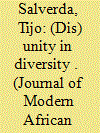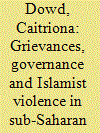| Srl | Item |
| 1 |
ID:
156766


|
|
|
|
|
| Summary/Abstract |
White Africans are particularly associated with the troubles South Africa and Zimbabwe have faced throughout their histories. The story of the Franco-Mauritians, the white elite of Mauritius, and how they have fared during more than forty years since the Indian Ocean island gained independence, is much less known. However, their case is relevant as a distinctive example when attempting to understand white Africans in postcolonial settings. Unlike whites elsewhere on the continent, Franco-Mauritians did not apply brute force in order to defend their position in the face of independence. Yet the society that emerged from the struggle over independence is one shaped by dominant beliefs about ethnicity. As this article shows, despite a number of inverse effects Franco-Mauritians have benefited from this unexpected twist, and part of the explanation for their ability to maintain their elite position lies therefore in the complex reality of ethnic diversity in postcolonial Mauritius.
|
|
|
|
|
|
|
|
|
|
|
|
|
|
|
|
| 2 |
ID:
156770


|
|
|
|
|
| Summary/Abstract |
This paper argues that when police reform in Sierra Leone was instituted to consolidate a state system after the country's civil war ended in 2002, it reproduced a hybrid order instead that is embodied by Sierra Leone's primary local leaders: paramount and lesser chiefs. In this sense, policing has a distinctly political quality to it because those who enforce order also define what order is and determine access to resources. The hybrid authority of Sierra Leone's chiefs emanates from multiple state-based and localised sources simultaneously and comes into play as policing takes place and police reform moves forward. This argument is substantiated by an ethnographic exploration of how and with what implications community policing has been introduced in Peyima, a small town in Kono District, and focuses on one of its primary institutional expressions, Local Policing Partnership Boards.
|
|
|
|
|
|
|
|
|
|
|
|
|
|
|
|
| 3 |
ID:
156768


|
|
|
|
|
| Summary/Abstract |
Fiscal sociology has alleged the existence of a mutually reinforcing effect between the emergence of representative government and effective taxation. This paper looks at Benin, a low-income country that successfully democratised in the early 1990s. It finds that Benin appears to have reinforced its extractive capacities since democratisation. However, the effect of democratisation has been indirect, while the influence of the International Financial Institutions (IFI) and the size of the country's informal sector have played a more direct role. Nevertheless, the hypothesis that effective taxation is based on a quasi-consensual relationship between the state and the taxpayers finds some confirmation.
|
|
|
|
|
|
|
|
|
|
|
|
|
|
|
|
| 4 |
ID:
156765


|
|
|
|
|
| Summary/Abstract |
What explains the emergence of Islamist violence as a substantial security threat in such diverse contexts as Kenya, Mali and Nigeria? This article addresses this question through an exploration of the strategies of governance employed by states, and how these shape the emergence and mode of collective violence. Conflict research often emphasises the specificity of Islamist violence; but these conflicts can be understood as a form of political exclusion and grievance-based violence, comparable to other forms of political violence. Further, violent Islamist groups emerge from local conditions: the areas in which groups are established share similar local experiences of governance and political marginalisation; a history of violent conflict on which Islamist militants capitalise; and key triggering events expanding or reinforcing state exclusion. These findings challenge a narrative emphasising the global, interconnected nature of Islamist violence. This article pairs data from the Armed Conflict Location & Event Dataset (ACLED) with Afrobarometer survey data and case study evidence to identify drivers of Islamist violence across three African countries.
|
|
|
|
|
|
|
|
|
|
|
|
|
|
|
|
| 5 |
ID:
156769


|
|
|
|
|
| Summary/Abstract |
Since the signing of the Sun City peace agreement in 2002, the Democratic Republic of Congo has strived to democratise with limited success. This paper explores some of the challenges of the process of democratisation in the Congo. It does so not by looking at democratisation policies and practices, but by focusing on identity construction and how these identities manifest themselves in Congolese engagements with the process of democratisation as a process that is pursued in partnership with Western donors. The paper traces the construction of an understanding of democracy as a means to make an end to perpetual victimisation of Congolese people due to foreign interference in the Congo. The paper argues that the concept of democracy has acquired over time a meaning that creates a highly ambivalent engagement with the current democratisation process, and in particular with Western donors of this process, which are simultaneously perceived as the main obstacles to its successful realisation.
|
|
|
|
|
|
|
|
|
|
|
|
|
|
|
|